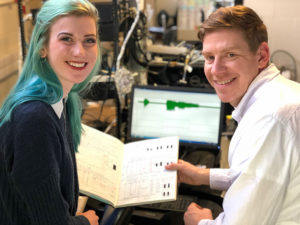New Duquesne Study Explores the Impact of Emotion on Pain
A $1.5 million grant will help Duquesne researchers study the influence that emotions have on a certain type of pain.

The study, led by Associate Biological Sciences Professor Dr. Benedict Kolber, will look at chronic bladder pain, a condition that has no known cause and is difficult to treat. Chronic bladder pain affects women more often than men, and it’s estimated that up to 10 percent of women may be afflicted.
One of the key components of the study will try to determine the role emotions might play in creating symptoms and transmitting pain to the brain.
“There is an important emotional component to chronic bladder pain,” said Kolber, who has been studying the condition for 10 years. “People with chronic bladder pain are also more likely to suffer from anxiety and depression and experience pain in other parts of the body.”
The study, funded by the National Institutes of Health (NIH) and the National Institute of Diabetes and Digestive and Kidney Diseases (NIDDK), will use physiological techniques and behavior to determine which parts of the brain are activated during bladder pain.
“The first step will use physiology to determine the changes that the brain goes through from acute to chronic bladder pain and to see where chronic pain is coming from,” Kolber said. “By identifying the role of the brain, we can determine how pain information is transmitted to and maintained in the brain and how that might impact other symptoms.”
Throughout the study, the research team will interact with people who suffer from this illness to maintain a strong connection with Kolber’s basic science research. He hopes the interactions will eventually lead to crafting better models to help understand and prevent bladder pain.
The research effort recently received another boost when Heather Allen, a third-year biology doctoral student and member of Kolber’s team, received the Kirschstein National Research Service Award from the NIH and NIDDK. It marks only the second time a Duquesne student has received a NIH Predoctoral Fellowship.
The highly competitive award—worth more than $125,000 over three years—is presented to only a small fraction of applicants, Kolber said, and will offer financial support to Allen while she conducts her dissertation research in Kolber’s lab. The goal of Allen’s project is to discover the novel types of brain cells that control bladder pain and new treatment options for patients.
“Heather is a creative and fearless researcher,” Kolber said. “This award involved the development of a novel research proposal using innovative techniques and a unique graduate training plan. The award represents an important step forward in a successful career for Heather.”
